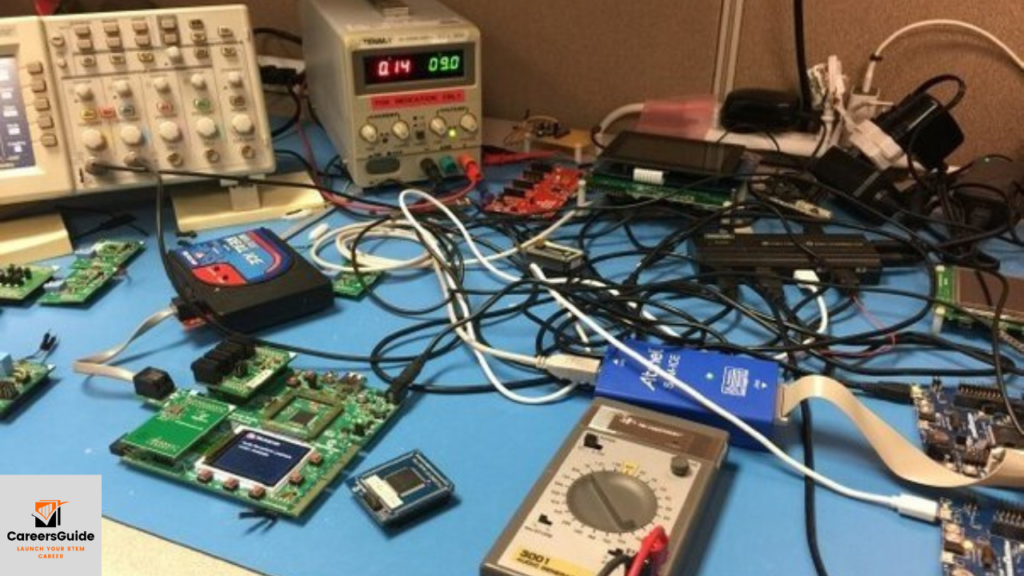1. Introduction to Firmware Engineering
Firmware engineering is a specialized field that involves designing, developing, and maintaining firmware, which is a type of software that provides low-level control for the hardware of electronic devices. It plays a crucial role in ensuring the proper functioning of various devices, ranging from consumer electronics to industrial machinery.
2. Understanding Firmware Engineering
What is firmware?
Firmware refers to the software that is embedded into hardware devices to control their operations. Unlike regular software, firmware is tightly integrated with the hardware and is stored in non-volatile memory, such as ROM or flash memory.

Role of a firmware engineer
Firmware engineers are responsible for writing, testing, and debugging firmware code. They work closely with hardware engineers to ensure compatibility and optimize performance.
3. Skills Required
Becoming a successful firmware engineer requires a combination of technical expertise and soft skills.
Technical skills
Firmware engineers should have proficiency in programming languages such as C, C++, and assembly language. They should also possess knowledge of hardware architecture and embedded systems.
Problem-solving skills
The ability to troubleshoot complex issues and find innovative solutions is essential for firmware engineers. They often encounter challenges related to device compatibility, performance optimization, and debugging.
Communication skills
Effective communication is crucial for collaborating with cross-functional teams, documenting code, and presenting solutions to stakeholders.
4. Educational Background
While there is no strict educational requirement to become a firmware engineer, most employers prefer candidates with a degree in computer science, electrical engineering, or a related field.
Relevant degrees
A bachelor’s or master’s degree in computer engineering, electrical engineering, or a related discipline provides a strong foundation for a career in firmware engineering.
Certifications and courses
Obtaining certifications such as Certified Firmware Developer (CFD) or completing online courses in embedded systems can enhance your credentials and marketability.
5. Building Technical Skills
To excel in firmware engineering, aspiring professionals need to continually hone their technical skills.
Programming languages
Mastering programming languages commonly used in firmware development, such as C and C++, is essential. Additionally, familiarity with scripting languages like Python can be beneficial for automating tasks.
Understanding hardware
A deep understanding of hardware components and their interactions with firmware is crucial for optimizing performance and addressing compatibility issues.
Embedded systems knowledge
Firmware engineers should be proficient in working with embedded systems, including microcontrollers, sensors, and communication protocols.
6. Gaining Practical Experience
Practical experience is invaluable for aspiring firmware engineers to apply their theoretical knowledge and develop hands-on skills.
Internships
Seeking internships at electronics companies or firmware development firms can provide valuable real-world experience and networking opportunities.
Personal projects
Engaging in personal projects, such as building small electronic devices or contributing to open-source firmware projects, allows aspiring engineers to showcase their skills and creativity.
7. Networking and Building Connections
Networking plays a vital role in advancing a career in firmware engineering.
Joining professional organizations
Membership in organizations such as the Institute of Electrical and Electronics Engineers (IEEE) or the Embedded Systems Professionals Network (ESPN) provides access to resources, networking events, and professional development opportunities.
Attending conferences and workshops
Participating in industry conferences, workshops, and seminars allows firmware engineers to stay updated with the latest trends, technologies, and best practices.
8. Job Search and Application Process
Securing a position as a firmware engineer requires a strategic approach to the job search and application process.
Crafting a resume
Tailoring your resume to highlight relevant skills, experience, and achievements in firmware engineering increases your chances of standing out to potential employers.
Preparing for interviews
Preparing for technical interviews by practicing coding challenges, reviewing fundamental concepts, and showcasing problem-solving abilities is essential for success.
9. Entering the Field
Entry-level positions provide opportunities for aspiring firmware engineers to gain practical experience and further develop their skills.
Entry-level positions
Common entry-level roles include firmware engineer, embedded software developer, and software engineer with a focus on firmware development.
Junior firmware engineer roles
Junior firmware engineers work under the guidance of senior team members, gaining exposure to different aspects of firmware development and project management.
10. Continuous Learning and Growth
The field of firmware engineering is constantly evolving, requiring professionals to stay updated with the latest advancements.
Staying updated with technology
Keeping abreast of emerging technologies, industry trends, and best practices through continuous learning and professional development ensures career relevance and growth.
Seeking mentorship
Seeking mentorship from experienced firmware engineers or industry professionals can provide valuable guidance, feedback, and career advice.
11. Career Progression
As firmware engineers gain experience and expertise, they can explore opportunities for career advancement and growth.
Senior firmware engineer roles
Senior firmware engineers take on leadership roles, overseeing projects, mentoring junior team members, and contributing to strategic decision-making.
Leadership opportunities
Experienced firmware engineers may transition into management positions, such as firmware engineering manager or technical director, where they are responsible for leading teams and driving innovation.
12. Challenges and How to Overcome Them
Firmware engineering presents various challenges that require resilience, adaptability, and perseverance to overcome.
Overcoming technical challenges
Encountering technical hurdles, such as hardware limitations, software bugs, and compatibility issues, is common in firmware development. Collaborating with colleagues, leveraging resources, and seeking creative solutions are key to overcoming these challenges.
Dealing with imposter syndrome
Many firmware engineers experience imposter syndrome, doubting their abilities and feeling inadequate despite their accomplishments. Building self-confidence, seeking support from peers and mentors, and focusing on continuous improvement can help individuals overcome imposter syndrome and thrive in their careers.
13. Salary and Compensation
Firmware engineers are typically well-compensated for their specialized skills and expertise.
Average salary range
The salary of a firmware engineer varies depending on factors such as experience, location, and industry. On average, entry-level firmware engineers can expect to earn between $60,000 and $80,000 annually, while senior-level professionals may earn upwards of $120,000 per year.
Factors affecting compensation
Additional factors that influence salary and compensation include the size and reputation of the employer, the complexity of projects, and the demand for firmware engineering talent in the job market.
14. Future Outlook and Opportunities
The future outlook for firmware engineers is promising, with ample opportunities for growth and advancement.
Emerging technologies
Advancements in fields such as Internet of Things (IoT), wearable devices, and autonomous vehicles are driving demand for skilled firmware engineers. As technology continues to evolve, new opportunities will emerge for professionals with expertise in firmware development.
Job market trends
The demand for firmware engineers is expected to remain strong, particularly in industries such as aerospace, automotive, healthcare, and consumer electronics. Companies are continually seeking innovative solutions and products that require firmware expertise, creating a favorable job market for qualified candidates.
15. Conclusion
Becoming a firmware engineer requires dedication, technical proficiency, and a commitment to continuous learning. By acquiring the necessary skills, gaining practical experience, and leveraging networking opportunities, individuals can embark on a rewarding career in firmware engineering. Despite the challenges and obstacles they may encounter along the way, firmware engineers have the opportunity to make significant contributions to technology innovation and development. Explore the hottest STEM career opportunities waiting for you!



